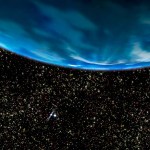
In the beginning there was light.
Sort of.
When energies were high enough, particles were effectively massless and the universe was a nice seething mess of particle/anti-particle creation and annihilation.
As the universe cools, a symmtery, the Electroweak symmetry breaks, a field condenses out, and interesting stuff starts happening.
Hence we get chemistry, and the autocatalytic evolving goo that reaches out and ties to puzzle out where it all came from.
In the Standard Model of Particle Physics, the rest mass of the spectrum of normal matter particles is dynamically generated. The mass we…
It is another hot and sultry friday, and that means it is time for the iPod iChing!
Oh, Mighty iPod One, what may come in the near term of our endless quest to seek Extraterrestrial Intelligence?
Woosh goes the randomizer.
Woosh.
The Covering: Peter and Wolf: The Story Begins - Prokoviev
The Crossing: Take It All - Adele
The Crown: Girlfriend is Better (Live) - Talking Heads
The Root: Vertigo - U2
The Past: Shadow Play - Joy Division
The Future: Downbound Train - Raul Malo
The Questioner: Crosseyed and Painless - Talking Heads
The House: Nú Er Glatt Í Hverjum Hól - Trad.
The Inside: I…
Why do we need to spend any more effort on extra-solar planets?
We found some, they're there. Lumps of rocks, gasballs. We're done, right?
This, loosely paraphrased, was a serious question I got last week.
The context was a question of why I was spending serious effort on exoplanet research, rather than focusing exclusively on other subfields.
I've heard similar comments from physicists, some particle physicists are notoriously focused in their consideration of what counts as "real physics", but this came from an astronomer; and one that I know does stars, inside the galaxy, sometimes, not…
"Name one thing robots can't do in space that humans can!" was the challenge from a speaker at a meeting I attended many years ago.
"Have babies!" was the loud and prompt reply from a grad student friend of mine at the back, thereby winning the argument to great applause.
It is important to remember that while science and discovery is important, it is not the ontological basis for space exploration.
Space is, ultimately, about existential motivations. The science helps drive the motivation, and provides the information that enables space exploration, but is in many important ways not the…
David Brin has a new novel out, Existence
Brin is on a book tour at independent book stores on the west coast and was in the Bay Area saturday, where he spoke at Kepler's Books in Menlo Park, having stopped by at SETIcon II earlier.
David Brin
The book is nice and chunky, and is a medium future novel, somewhat in the spirit of Earth.
I am told that the story also includes the beginning of Uplift as a side plot.
David is one of my all time favourite authors, and while at Caltech, as a founding member of SPECTRE, the legendary Caltech Science Fiction Club, I hosted him for the first of…
SETIcon feels like a curious mix of an AAS annual meeting and a science fiction WorldCon.
Unfortunately, this extends to the concept of the parallel session.
So, it is necessary to pick and choose.
So, "Asteroids: Junkpiles or Resources?" - Yes.
"Hubble 3D" - I really want to see Frank Summers' rendition, but I'll get another chance.
And, while I do want to know "When I can buy a ticket to the Moon", I got the rah-rah spiel
on the impressive progress in commercial space already.
Hence the panel on: "The Next Big Science Revolution" - I gots to know.
As apparently does everyone else. Another "…
Seen in the exihibition room at SETIcon
Yes, that is what you think it is:
Romulan Ale from Rocket Fizz
From Real Art
We know now that there are planets out there.
Lots and lots of planets.
We are still pinning down the exact incidence over all stellar populations, and we are barely at the point where we can directly confirm the presence of terrestrial planets, but if parameter space is smooth and the universe does not conspire against us, then terrestrial planets must be quite common.
10% incidence would not be a bad conservative guess, but I would not be surprised if the incidence is 30-50%.
We will know for sure soon.
We don't know how life starts.
We have some well founded suspicions, and every year the…
The SETI Institute is sponsoring the Second Search for Extraterrestrial Intelligence Conference at the San Jose Santa Clara Convention Center this weekend.
The Conference is an unusual blend of hard science, science fiction and media: with Geoff Marcy, Alex Filippenko and Debra Fischer, among others, mixing in with NASA honchos, Silicon Valley enthusiasts and Bill Nye the Science Guy.
There are three days of talks, presentations and parallel sessions on topics ranging from "The Kepler Mission" to "Would Discovering ET Destroy Earth's Religions".
Saturday night Jill Tarter is being honoured…
"Statistical thinking will one day be as necessary for efficient citizenship as the ability to read and write." H.G.Wells
Today! I swung by the penultimate session of the VIIIth Summer School in Statistics for Astronomers, just to catch a couple of old friends who were at the school, chat a bit at the coffee break, and get a quick refresher in clustering...
The school, being the 8th in a series, is offered by the Penn State Center for Astrostatistics, an NSF funded interdisciplinary center in, well, astronomy and statistics.
The school is very popular, and is aimed at graduate students in…
there is a curious result in behavioural economics, which shows that paying people to do what they like to do, sometimes provides a disincentive for them to do it, and people correspondingly lower their effort to do the task.
The example I recently came across, from the 7 Rules of Behavioural Economics, or some such, was that if you pay people to have their friends for dinner, they entertain less.
But, enough about the decline of intradepartmental socialization...
The reason I thought of this, is that yesterday we congratulated a colleague on a nice result, and another colleague asked some…
In which NASA gets presented with two Hubble class wide field space telescopes...
Oh my. So some of the mysterious maneuverings at NASA's Astrophysics division can now be better understood.
The National Reconnaissance Office was sitting on a couple of spare space telescopes they are willing to transfer to NASA.
These are presumably late block Keyhole reconnaissance satellite spares, maybe even the two extras orders a few years ago at the end of the program.
So, state of the art as of 10-20 years ago.
We are looking at two partial telescopes, with a Hubble size primary mirror, 2.4m, but…
It is friday!
On fridays, we have an occasional tradition to invoke the ever omniscient iPod One, Mighty is the iPod One, and do our own divination, a musical haruspicy if you like, where the diverse and assorted cards of our harmonies are cast upon the net to reveal our destinies, or permit us to project our pareidoliac tendencies upon the anthropic aspects of our anthems.
It is also a great excuse to load up some old tunes and fill up blog space as we settle into our new digs.
So, oh Mighty iPod, what does the future hold as the ScienceBrethren settle into the embrace of our new Overlords?…
The word came out last night that the GEMS Small Explorer Class Mission has been cancelled.
GEMS is an x-ray polarimetry mission, using new detector technology, and the rumours (from the "Astronomers" group on fb) are that an Independent Cost Estimate showed the mission blowing its budget.
The mission passed a design review earlier this spring, but was red flagged on the mission chart at a recent NASA Astrophysics status presentation.
Now, some of you may remember the flap over the NASA Senior Review last month.
A review of ongoing missions recommended that all be continued at present level…
Just a quick heads-up for those who don't know yet: there is closed group "Astronomers" on facebook. It is by invitation only, ie some existing member must add any new member. You must have an fb account to be added.
The group has about 4,000 members, most all professional astronomers from around the world.
There is some interesting discussion going on in that group and some useful info being passed around.
The closed group feature seems to work well for some combination of intensity of topic focus and size - not too small, not too big.
'fraid I wouldn't tell how to monetize the feature…
Interesting new look, could do with a coat of paint, some decor and maybe a pic on the wall, eh?
Lets take this for a spin and see how it works.
To dos:
Blogroll
Favourite posts
Pic
Hm, does ð html coding work?
Awesome.
From The Rock
Recently I've spent far more time than I care to pondering this concept...
Nah, not as serious as it sounds - the National Geographic Overlords are transitioning the Sb collective to newer blog platform:
Transitional Technical Difficulties - Chad explains.
It is why the Scienceblogs have been a bit subdued recently
I promise I'll clean house after the move, including updating the blogroll, if the new digs have such quaint olde things as blogrolls
Some linkedy links that need to be placemarked
Asking the students
Gender Issues
Trickle Down Science
Backreaction: Top Ten
Dark Matter vs MOND: a Trialogue - Sean hosts a rational exchange



